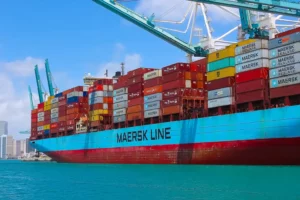Maersk’s stock fell sharply due to a grim outlook for the maritime industry later this year.
The decline relates to an expected end to the freight rate rise caused by the Red Sea conflict.
Maersk forecasts a modest 2.5% to 4.5% growth in global container trade, missing many analysts’ predictions.
The Red Sea issue affects about one-third of Maersk’s fleet, with disruptions anticipated to last up to a year.
Stock values dropped around 15% in Copenhagen, wiping out the gains since the conflict began in mid-December. Rivals Hapag-Lloyd and D/S Norden also experienced drops.
CEO Vincent Clerc shared concerns over the escalating weapon use in the Red Sea and the absence of a coordinated international response for safe navigation.

He believes the threat level has yet to peak.
Targeted by Houthi missiles, Maersk had to detour its ships south of Africa. These attacks have significantly disrupted a critical maritime trade route, spiking freight rates.
Clerc noted that this crisis might obscure the broader issue of global overcapacity for a while.
Yet, with a 12% to 13% expected increase in the container fleet due to new ships, capacity issues will eventually outweigh the current extended route demands.
Clerc downplayed the Red Sea conflict’s impact compared to COVID-19 and other events on shipping rates.
He had previously highlighted the enduring challenge of overcapacity, leading to a significant job cut to save costs.
The uncertainty has led Maersk to suspend its share buyback program, pending a review of market conditions in its maritime unit.
The company predicts significant industry oversupply challenges to emerge in 2024, setting a broad guidance range due to the unpredictability of the Red Sea disruption.
It expects a stronger performance at the year’s start compared to its end.
Maersk’s EBITDA projection for the year is $1 billion to $6 billion, below the analyst average of $6.41 billion. Its fourth-quarter earnings also fell short of expectations.
Furthermore, Maersk plans to spin off its Svitzer towing unit, aiming for an April listing on the Copenhagen stock exchange. Shareholders will receive shares in the separated entity.
Before this report, Maersk faced IT issues in America, which Clerc clarified were not due to a cyberattack and had been resolved with limited operational impact.

